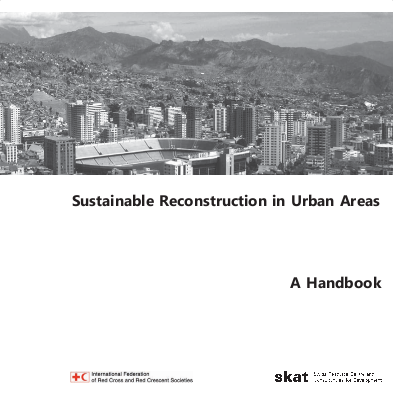A handbook

The handbook is focused on the reconstruction phase, in particular on permanent housing, not on transitional shelter. It also incorporates risk-reduction measures within reconstruction methodology in order to prepare for any future disaster. The handbook concentrates primarily on the transfer of emergency shelter to more permanent housing solutions following a disaster. It gives specific direction in how to overcome the complexity and challenges of reconstruction by ensuring that safe and sustainable approaches are taken within urban areas.
This handbook does not cover every activity to be performed throughout the programme cycle. It is for use as a reference point only for reconstruction programmes; it enables the user to understand and engage in the main issues that make up a sustainable reconstruction programme.
The handbook is not only relevant to the most recent Haiti emergency but refers generically to similar post-disaster situations in less-developed countries in Latin America, Southern and Central Asia, and Africa.
The handbook concentrates on the reconstruction phase. The objectives of the handbook are to:
provide technical information on the sustainable neighbourhoods and integrated settlement approaches, including construction materials and technologies, energy effciency and ecological aspects, alternative water supply and sanitation systems, solid waste, and environmentally friendly site management in high-risk and poor-income areas
offer guidance on the reuse and recycling of temporary shelters, and on the transfer from transitional shelter to permanent housing, it includes orientation on damage assessments, debris reuse and controlled demolition
provide a selection of successful post-disaster reconstruction examples, implemented in cities with recommendations for better disaster preparedness
present practical checklists and references to assist practitioners, field workers and other stakeholders in making their choices.
Links
Resource collections
- Evaluating humanitarian action
- UN Habitat - Urban Response Collection
- Urban Response - Urban Crisis Preparedness and Risk Reduction
- Urban Response Collection - Community Engagement and Social Cohesion
- Urban Response Collection - Economic Recovery
- Urban Response Collection - Environment and Climate Change
- Urban Response Collection - Housing, Land and Property
- Urban Response Collection - Urban Crisis Response, Recovery and Reconstruction
- Urban Response Collection - Urban Resilience